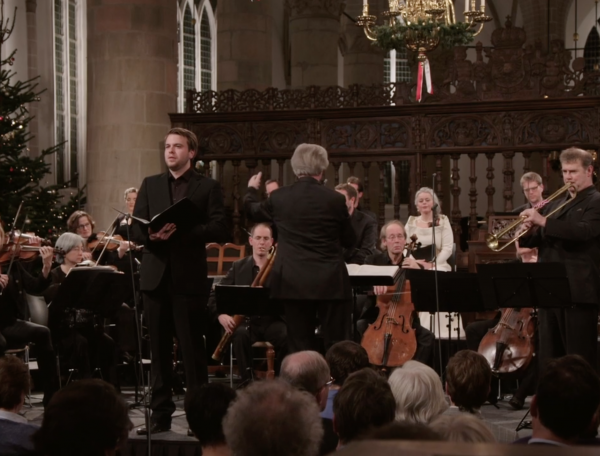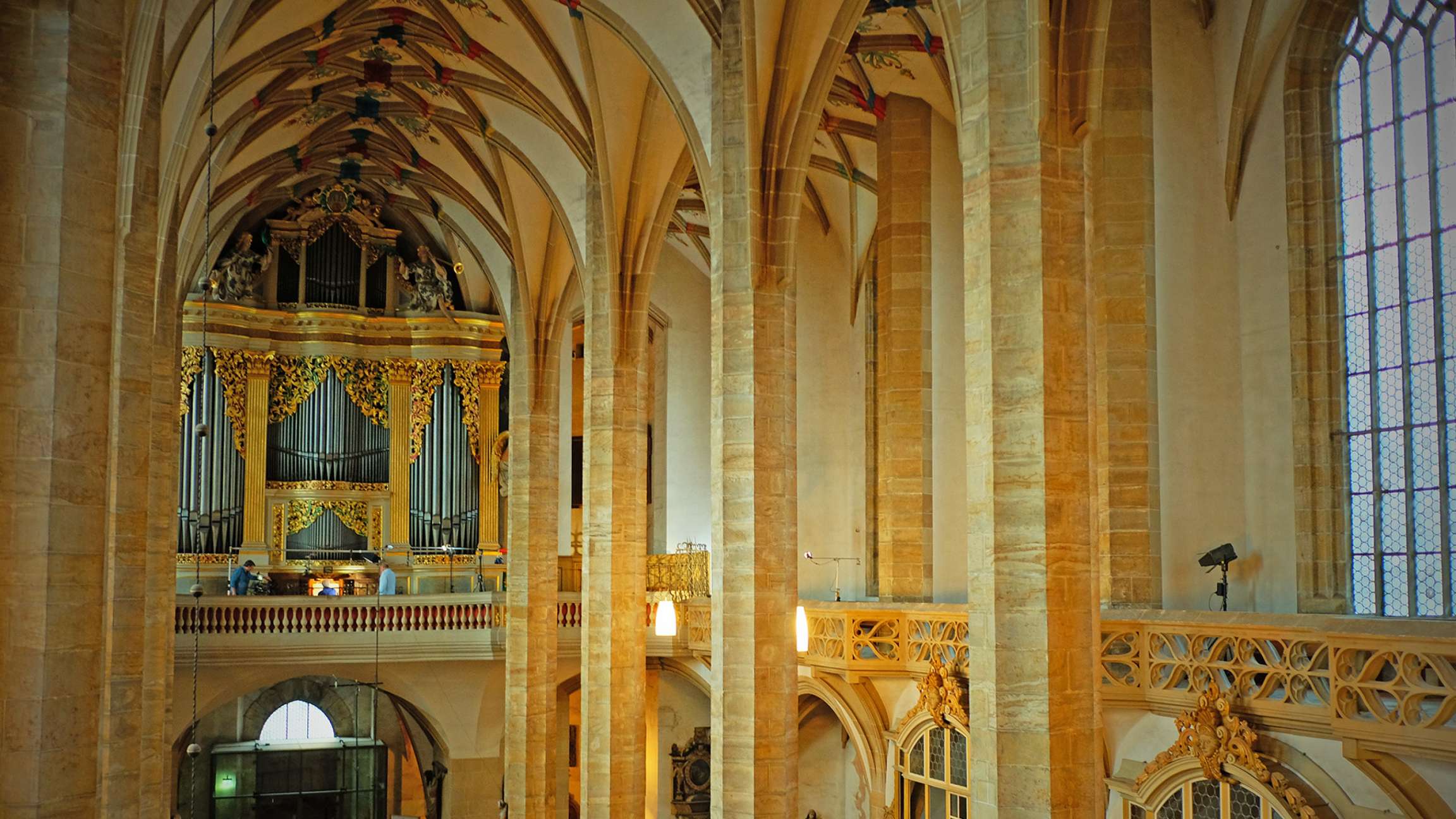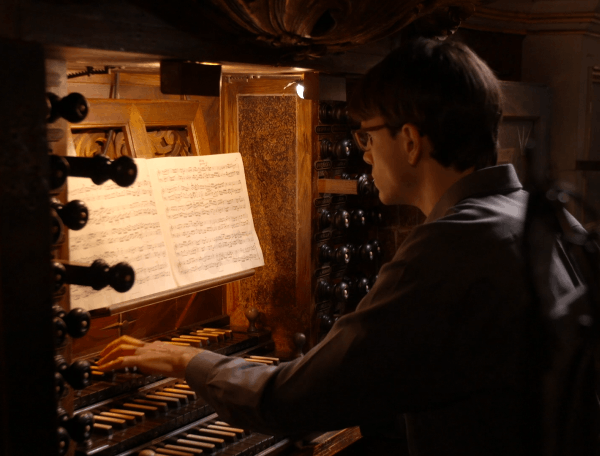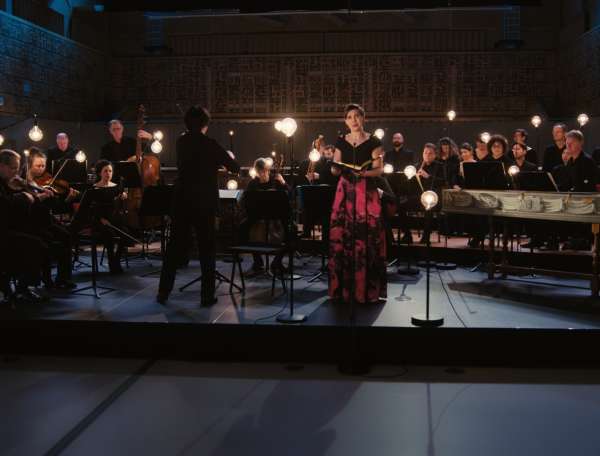

In dulci jubilo
BWV 608 performed by Laurens de Man
Freiberger Dom Sankt Marien, Freiberg, Germany
Behind the music
Heavenly dance
The melody of this chorale prelude came about through divine inspiration
Though extremely short, this chorale prelude is nevertheless fairly well-known. That’s not surprising, as the hymn on which Bach based the prelude has been popular for hundreds of years: the German Christmas carol ‘In dulci jubilo’ originated in the fourteenth century. Although you can’t hear it any more in today’s familiar arrangements, the melody was originally intended to be sung in canon. Bach immediately seizes this musical opportunity, although of course entirely in his own way. The melody is heard in the soprano part, and is then repeated in the bass part. But Bach also adds middle voices, which augment the lyrical melody with a complex harmony. Moreover, the dancy quavers in these middle voices are reminiscent of the hymn’s creation myth, which is as follows:
The German mystic Hendrik Seuse tells how an angel descended to him in a vision. This angel took Seuse’s hand and led him in a heavenly dance, amid a choir of angels. Seuse then spontaneously broke into a hymn of praise for the birth of Jesus; a hymn that would later be known all over Northern Europe as ‘In Dulci Jubilo’. The hymn is unusual in that the words are written in both Latin and German, with lines that flow from one language into the other. So the language of the church blends with the worldly, exactly as it does in Seuse’s vision. This is not heard in Bach’s prelude, however, as the words only appeared in the community singing for the congregation in Bach’s day.
The nice thing about this arrangement is the particularly high register, which suggests a delicate stop selection. The bass part is very high; in the tenor register rather than the bass. In order to let the organist play the part with the pedals anyway, he or she uses a four-foot stop, meaning that the part sounds an octave higher.
Orgelbüchlein, BWV 599-644
During his time as court organist at Weimar (1708-1714), Bach already started compiling his first collection of chorale arrangements and chorale preludes (compositions based on Lutheran hymns). They were intended to be used in church services, and the preludes were an introduction to congregational singing. According to the list of contents in Bach’s manuscript, it was supposed to have been a collection of 164 compositions, but in the end it did not exceed 46 (BWV 599-644). The order, combined with the limited length of the pieces, indicates that Bach was planning to compile a complete cycle of chorale arrangements. Later, in his period at Köthen, he gave the collection a title page, which reads: ‘Orgel-Büchlein, Worinne einem anfahenden Organisten Anleitung gegeben wird, auff allerhand Arth einen Choral durchzuführen…’ (‘Little organ book, in which a beginner organist is taught to arrange a chorale in all sorts of ways...’). So at the time, he intended the collection just as a teaching manual, maybe to present on his application in 1722 for the post of cantor at the Thomasschule in Leipzig, which was an important teaching position. The pupils must have had a hard time of it, as the preludes contain the complete range of baroque keyboard techniques in a nutshell.
With support from
Extra videos
Vocal texts
Original
Translation
Credits
-
- Release date
- 21 December 2023
-
- Recording date
- 16 September 2020
-
- Location
- Freiberger Dom Sankt Marien, Freiberg, Germany
-
- Organ
- Laurens de Man
-
- Instrument
- Gottfried Silbermann, 1711-1714
-
- Director and editor
- Robin van Erven Dorens
-
- Music recording
- Guido Tichelman, Bastiaan Kuijt
-
- Music edit and mix
- Guido Tichelman
-
- Camera
- Robin van Erven Dorens, Onno van der Wal
-
- Lights
- Ernst-Jan Thieme
-
- Assistant music recording
- Marloes Biermans
-
- Producer
- Jessie Verbrugh
-
- With support from
- MWH4impact

